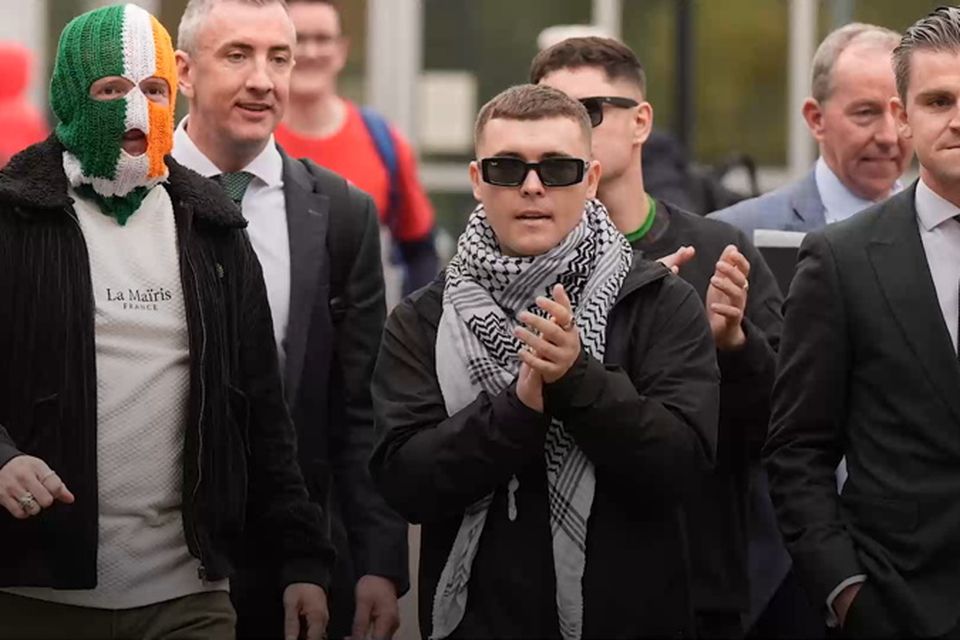World
Prosecutors Challenge Ruling to Dismiss Terror Case Against Rapper

Prosecutors in Northern Ireland are set to appeal a court decision that dismissed a terrorism case against rapper Liam Óg Ó hAnnaidh, a member of the group Kneecap. The ruling came after a procedural error related to the charges brought against him, which alleged that he displayed a flag supporting the proscribed terrorist organization Hezbollah during a performance in November 2022.
The case against Ó hAnnaidh had garnered significant media attention, raising questions about the implications of freedom of expression in the context of political messaging through music. The initial accusations stemmed from an incident in which the rapper was reported to have displayed the flag at a concert, an act that prosecutors argued constituted support for terrorism.
Legal Proceedings and Appeal
The chief magistrate determined that due to a technical error in the manner in which Ó hAnnaidh was charged, the case could not proceed. This decision has prompted the Public Prosecution Service (PPS) to file an appeal, aiming to overturn the ruling and reinstate the charges. The PPS has stated that it believes the initial decision to dismiss the case was incorrect and intends to seek a review.
Legal experts are now closely watching the developments, as the appeal could set a significant precedent regarding the prosecution of individuals for expressions deemed supportive of terrorist organizations. The case also raises broader debates about the balance between artistic expression and national security.
Ó hAnnaidh, 27, has not publicly commented on the appeal or the ongoing legal proceedings. His group, Kneecap, is known for its politically charged lyrics and has been active in discussions surrounding issues of identity and heritage in Northern Ireland.
Implications for Freedom of Expression
The appeal, while focused on legal technicalities, also touches on sensitive societal issues. Advocates for free speech have expressed concern over the potential implications of prosecuting artists for their performances. Critics argue that such actions could stifle artistic expression and limit the ability of musicians to address political issues in their work.
As prosecutors prepare for the appeal, the music community and legal analysts will be keenly observing the outcome, which could have lasting effects on how similar cases are handled in the future. The PPS is expected to present its case in the coming months, and the legal discourse surrounding this matter will likely continue to evolve.
The ramifications of this case extend beyond the courtroom, touching on broader themes of cultural expression, political dissent, and the role of art in society. As the appeal moves forward, it may provoke further discussions about the responsibilities and rights of artists in politically charged environments.
-

 Top Stories3 months ago
Top Stories3 months agoTributes Surge for 9-Year-Old Leon Briody After Cancer Battle
-

 Entertainment4 months ago
Entertainment4 months agoAimee Osbourne Joins Family for Emotional Tribute to Ozzy
-

 Politics4 months ago
Politics4 months agoDanny Healy-Rae Considers Complaint After Altercation with Garda
-

 Top Stories4 months ago
Top Stories4 months agoIreland Enjoys Summer Heat as Hurricane Erin Approaches Atlantic
-

 World5 months ago
World5 months agoHawaii Commemorates 80 Years Since Hiroshima Bombing with Ceremony
-

 Top Stories3 months ago
Top Stories3 months agoNewcastle West Woman Patricia Foley Found Safe After Urgent Search
-

 Top Stories5 months ago
Top Stories5 months agoFianna Fáil TDs Urgently Consider Maire Geoghegan-Quinn for Presidency
-

 World5 months ago
World5 months agoCouple Convicted of Murdering Two-Year-Old Grandson in Wales
-

 World5 months ago
World5 months agoGaza Aid Distribution Tragedy: 20 Killed Amid Ongoing Violence
-

 World5 months ago
World5 months agoAristocrat Constance Marten and Partner Convicted of Infant Murder
-

 Top Stories4 months ago
Top Stories4 months agoClimbing Errigal: A Must-Do Summer Adventure in Donegal
-

 Top Stories4 months ago
Top Stories4 months agoHike Donegal’s Errigal Mountain NOW for Unforgettable Summer Views









